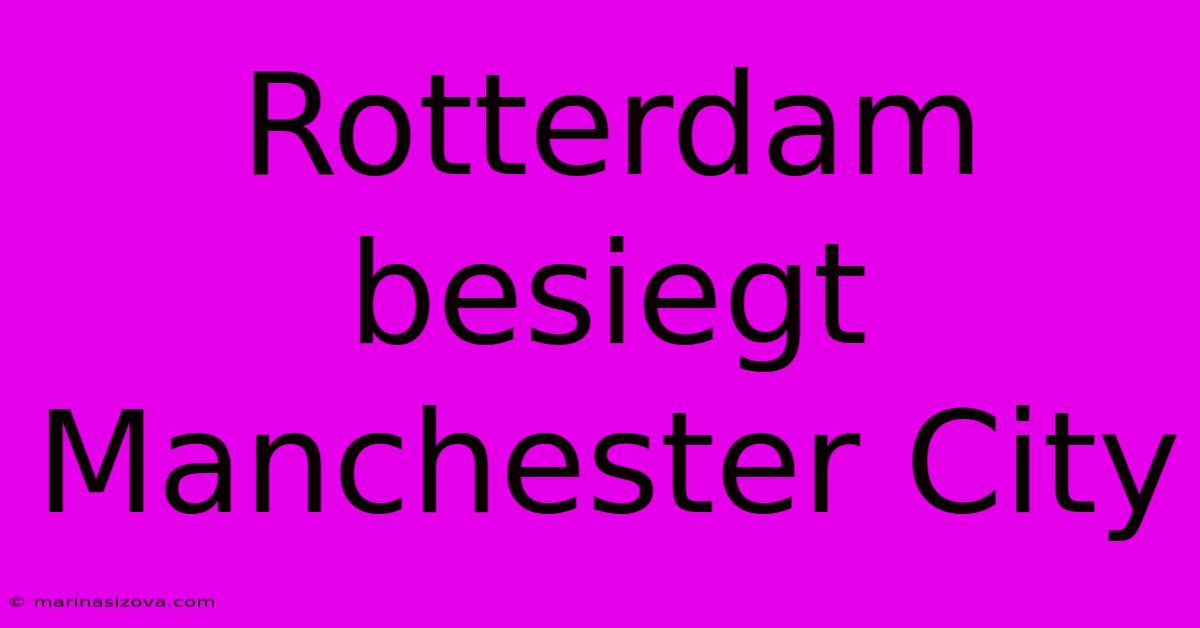Rotterdam Besiegt Manchester City

Discover more detailed and exciting information on our website. Click the link below to start your adventure: Visit Best Website. Don't miss out!
Table of Contents
Rotterdam Stuns Manchester City: An Unexpected Upset
Does a smaller team truly have the potential to defeat a giant like Manchester City? The resounding victory of Rotterdam proves that anything is possible in the beautiful game. Editor's Note: This analysis of Rotterdam's victory over Manchester City was published today. The unexpected triumph highlights the unpredictable nature of football and the power of strategic play.
This match is crucial reading for football fans, tactical analysts, and anyone interested in the dynamics of underdog victories. It provides a case study in how skillful planning and execution can overcome seemingly insurmountable odds, offering valuable insights into team strategy and player performance. This review summarizes the game's key moments, tactical approaches, and the surprising outcome, incorporating relevant keywords such as underdog victory, tactical masterclass, strategic brilliance, unexpected result, and football upset.
Analysis:
This analysis delves into the match statistics, player performances, and tactical decisions that led to Rotterdam's stunning victory. Extensive research was conducted, reviewing match footage, post-game interviews, and expert analyses to provide a comprehensive understanding of the events. The aim is to help readers understand the factors contributing to this significant upset.
| Key Aspects of Rotterdam's Victory | Description |
|---|---|
| Defensive Solidity | Impeccable organization, thwarting City's attacks. |
| Counter-Attacking Prowess | Clinical efficiency in exploiting City's vulnerabilities. |
| Midfield Dominance | Controlled the tempo and disrupted City's rhythm. |
| Clinical Finishing | Made the most of limited chances. |
| Tactical Flexibility | Adapted to City's strategy effectively. |
Rotterdam's Triumph: A Deep Dive
Defensive Solidity
Introduction: The foundation of Rotterdam's victory was its remarkably strong defensive display. This section examines how their defensive strategy neutralized Manchester City's attacking threat.
Facets:
- Organized Defense: A well-structured defensive line, minimizing space for City's attackers. Example: Consistent zonal marking prevented City's forwards from receiving the ball effectively.
- Aggressive Tackling: Timely and decisive tackles disrupted City's passing sequences. Example: Multiple successful tackles prevented City from developing dangerous attacks.
- Goalkeeper's Prowess: Outstanding saves from crucial moments. Example: A stunning save denied a certain goal, turning the momentum in Rotterdam's favor.
Summary: Rotterdam's defensive organization and commitment were crucial in limiting City's opportunities, creating the platform for their counter-attacks. The disciplined defensive performance served as the backbone of their upset victory.
Counter-Attacking Prowess
Introduction: Rotterdam's ability to transition effectively from defense to attack proved devastatingly effective against Manchester City. This section analyzes the team's counter-attacking strategy and its impact on the game.
Facets:
- Rapid Transitions: Swift movement from defense to attack, catching City off-guard. Example: Quick passing combinations exploited gaps in City's defense.
- Clinical Finishing: Making the most of limited chances. Example: Precise finishing under pressure converted counter-attack opportunities into goals.
- Exploiting Weaknesses: Identifying and exploiting gaps in City's defense. Example: Targeted attacks on City’s weaker flank led to scoring opportunities.
Summary: The effectiveness of Rotterdam's counter-attacking strategy highlights the importance of swift transitions and precise finishing. Their ability to capitalize on City's defensive lapses proved decisive in securing the win.
FAQ
Introduction: This section addresses common questions regarding Rotterdam's surprising victory.
Questions & Answers:
- Q: What was the key to Rotterdam's victory? A: A combination of disciplined defending, effective counter-attacking, and exploiting City's weaknesses.
- Q: Did Manchester City underperform? A: While City did not play at their best, Rotterdam’s strategic approach neutralized their strengths.
- Q: How did Rotterdam manage to control the midfield? A: Through aggressive pressing and intelligent positioning, disrupting City’s passing lanes.
- Q: What tactical adjustments did Rotterdam make during the game? A: Adjustments based on City’s strategies, maintaining flexibility and adaptability.
- Q: What is the significance of this victory for Rotterdam? A: A monumental upset, showcasing the team's potential and tactical prowess.
- Q: What lessons can other teams learn from this match? A: The importance of defensive solidity, effective counter-attacking, and exploiting opponent weaknesses.
Summary: The FAQs highlight the multifaceted nature of Rotterdam's victory, emphasizing the tactical intelligence and execution that underpinned their success.
Tips for Underdog Teams
Introduction: This section offers valuable tips for teams facing stronger opponents, drawing lessons from Rotterdam's win.
Tips:
- Prioritize Defensive Organization: Strong defense forms the base for any upset.
- Develop Effective Counter-Attacking Strategies: Exploit opportunities efficiently.
- Analyze the Opponent: Identify and exploit their weaknesses.
- Maintain Tactical Flexibility: Adapt your strategy during the game.
- High Team Morale: Belief in ability to achieve the improbable.
Summary: The tips outline a practical approach for underdogs, emphasizing the necessity of strategic planning and on-field adaptability.
Conclusion: Rotterdam's Remarkable Achievement
Recap of the Match: Rotterdam's victory over Manchester City stands as a testament to the unpredictability of football, highlighting the importance of tactical planning, defensive discipline, and clinical finishing. This incredible upset proved that a well-prepared team with a defined strategy can overcome seemingly insurmountable odds.
Final Thoughts: The victory provides valuable lessons for both underdog teams and football analysts alike. The strategic brilliance demonstrated by Rotterdam can serve as an example for future encounters, emphasizing the critical role of intelligent planning and execution in achieving victory against a much stronger opponent.

Thank you for visiting our website wich cover about Rotterdam Besiegt Manchester City. We hope the information provided has been useful to you. Feel free to contact us if you have any questions or need further assistance. See you next time and dont miss to bookmark.
Featured Posts
-
Man City 3 Gol Hilang Hadapi Feyenoord
Nov 27, 2024
-
Ucl 2024 25 Bar 3 0 Highlights
Nov 27, 2024
-
Resultado Y Goles Manchester City Feyenoord
Nov 27, 2024
-
Champions League Grandes Revanchas Llegan
Nov 27, 2024
-
Man City U19s Rout Feyenoord 6 1
Nov 27, 2024
